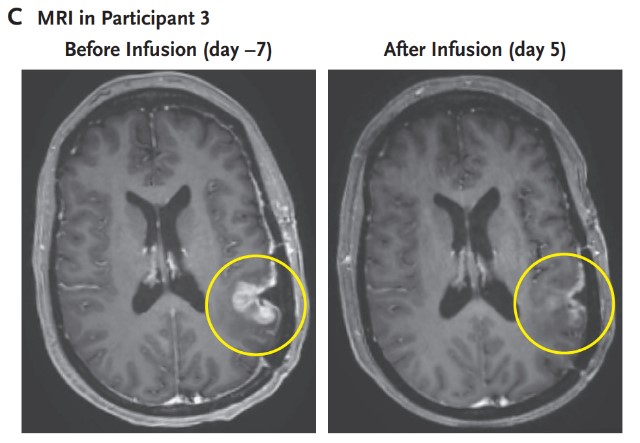
A promising glioblastoma clinical trial: Mass General cancer researchers say tumors dramatically shrunk
A new glioblastoma study is providing a glimmer of hope for those battling the aggressive and fast-growing brain tumor, as a novel treatment helped dramatically shrink the tumor in patients.
A Phase 1 clinical trial out of Mass General recently used a new cell therapy in patients with recurring glioblastoma.
Just days after a single treatment, the tumors dramatically reduced in size, according to the Mass General Cancer Center researchers. One patient even saw near-complete tumor regression.
“These results are exciting, but they are also just the beginning — they tell us that we are on the right track in pursuing a therapy that has the potential to change the outlook for this intractable disease,” said Marcela Maus, director of the Cellular Immunotherapy Program at Mass General Cancer Center.
“We haven’t cured patients yet, but that is our audacious goal,” Maus added.
MRI scans for the three patients with recurrent glioblastoma, conducted before and after the treatment, showed major shrinkage in the tumor size.
The trial tested a new type of CAR-T cell therapy, which arms the body’s own cells to fight the cancer. A patient’s cells are extracted, modified to produce proteins on their surface called chimeric antigen receptors, and then injected back into the body to target the tumor directly.
In the trial, a 57-year-old woman was treated with CAR-TEAM cells. An MRI five days after a single infusion of CAR-TEAM cells showed near-complete tumor regression.
Also, a 72-year-old man was treated with a single infusion of CAR-TEAM cells. Two days after receiving CAR-TEAM cells, an MRI showed a decrease in the tumor’s size by 18.5%. By day 69, the tumor had decreased by 60.7%, and the response was sustained for more than 6 months.
Despite the remarkable responses among the first three patients, the tumors eventually recurred within 6 months in two of the study’s patients — so the researchers are now working to find new ways to extend the durability of the treatment.
Related Articles
Why are more young adults getting colorectal cancer? Mass General researcher is trying to find out
Vaccine skepticism, equity issues hinder cervical cancer fight
Candy O’Terry, ‘Boston’s beloved radio voice,’ diagnosed with cancer: ‘Don’t miss your mammogram!’
Dana-Farber Cancer Institute to retract 6 studies, correct 31 after ‘data forgery’ allegations
Cancer patients face frightening delays in treatment approvals
“We report a dramatic and rapid response in these three patients,” said co-author Elizabeth Gerstner, a neuro-oncologist in the Department of Neurology at Massachusetts General Hospital.
“Our work to date shows signs that we are making progress, but there is more to do,” Gerstner added.
The new approach is a result of years of collaboration and innovation springing from Maus’ lab.
“This is a story of bench-to-bedside therapy, with a novel cell therapy designed in the laboratories of Massachusetts General Hospital and translated for patient use within five years, to meet an urgent need,” said Bryan Choi, neurosurgeon and associate director of the Center for Brain Tumor Immunology and Immunotherapy, Cellular Immunotherapy Program, Mass General Cancer Center and Department of Neurosurgery.
“The CAR-T platform has revolutionized how we think about treating patients with cancer, but solid tumors like glioblastoma have remained challenging to treat because not all cancer cells are exactly alike and cells within the tumor vary,” Choi added. “Our approach combines two forms of therapy, allowing us to treat glioblastoma in a broader, potentially more effective way.”
The brain tumor killed John McCain and Beau Biden, among others who have so few treatment options.
Heather Walker, a longtime Celtics executive and the team’s vice president of public relations, died last year following a nearly two-year battle with glioblastoma. She had been working relentlessly to raise awareness and money to research the rare and aggressive form of cancer. She started the Heather Walker Fund for Glioblastoma Research at Dana-Farber Cancer Institute, where she was being treated.
Members of the Mass General Cancer Center research team. From left to right: ElizabethGerstner, William Curry, Marcela Maus, Bryan Choi, KathleenGallagher, and Matthew Frigault. (Kate Flock/MGH)


